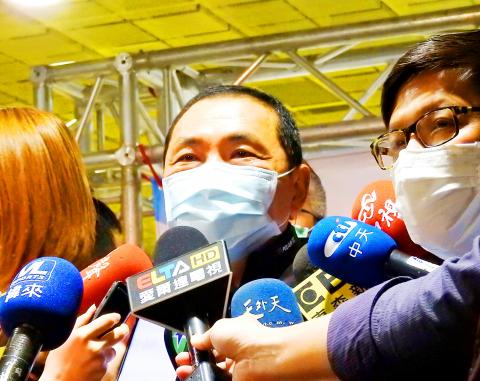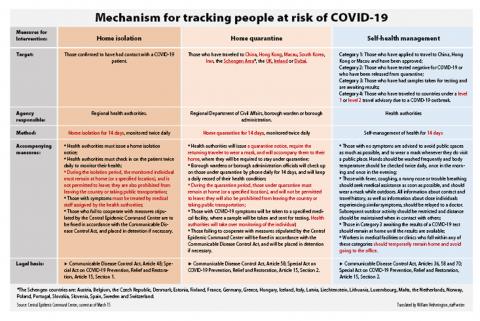The government has decided to prohibit students and teachers at high-school level and below from traveling abroad until the end of this semester due to the recent increase in the number of imported COVID-19 cases, the Central Epidemic Command Center (CECC) said yesterday.
Following discussions with experts, the Executive Yuan and other government agencies, the center decided that overseas travel would be inappropriate during the pandemic and made a recommendation that the Executive Yuan require that students and teachers at institutions below tertiary level not go abroad, said Minister of Health and Welfare Chen Shih-chung (陳時中), who heads the center.
The requirement would be in effect through the final day of classes, Chen said.

Photo: CNA
The announcement came after the New Taipei City Government yesterday said that it was prohibiting students and teachers below tertiary level from traveling overseas.
Several cities and counties followed suit, while some local governments called on the central government to create a policy on the matter.
The moves came after reports that a senior-high student living in northern Taiwan had been diagnosed with COVID-19. The school’s classes were the first in the nation to be suspended due to the disease.

New Taipei City Mayor Hou You-yi (侯友宜) said that unless they have a special reason, students and teachers below tertiary level cannot travel abroad before the semester ends.
Students whose parents insist on taking them abroad would be penalized, New Taipei City Education Department Commissioner Chang Ming-wen (張明文) said.
Their leave would only be approved if they are traveling for a competition, to visit relatives or other special reasons, he added.
Prior to the CECC’s announcement, the National Students’ Rights Seminar in Taiwan, in response to the several local government following New Taipei City’s ban, said in a statement that it believed the local governments’ travel restrictions were in violation of Article 10 of the Constitution, which guarantees the “freedom of residence and of change of residence.”
Earlier yesterday the Ministry of Education said that it had asked schools to reach out to students, faculty and staff returning from abroad to confirm if they would need to be quarantined at home or manage their own health.
Additional reporting by Sherry Hsiao

Taiwanese can file complaints with the Tourism Administration to report travel agencies if their activities caused termination of a person’s citizenship, Mainland Affairs Council Minister Chiu Chui-cheng (邱垂正) said yesterday, after a podcaster highlighted a case in which a person’s citizenship was canceled for receiving a single-use Chinese passport to enter Russia. The council is aware of incidents in which people who signed up through Chinese travel agencies for tours of Russia were told they could obtain Russian visas and fast-track border clearance, Chiu told reporters on the sidelines of an event in Taipei. However, the travel agencies actually applied

New measures aimed at making Taiwan more attractive to foreign professionals came into effect this month, the National Development Council said yesterday. Among the changes, international students at Taiwanese universities would be able to work in Taiwan without a work permit in the two years after they graduate, explainer materials provided by the council said. In addition, foreign nationals who graduated from one of the world’s top 200 universities within the past five years can also apply for a two-year open work permit. Previously, those graduates would have needed to apply for a work permit using point-based criteria or have a Taiwanese company

The Shilin District Prosecutors’ Office yesterday indicted two Taiwanese and issued a wanted notice for Pete Liu (劉作虎), founder of Shenzhen-based smartphone manufacturer OnePlus Technology Co (萬普拉斯科技), for allegedly contravening the Act Governing Relations Between the People of the Taiwan Area and the Mainland Area (臺灣地區與大陸地區人民關係條例) by poaching 70 engineers in Taiwan. Liu allegedly traveled to Taiwan at the end of 2014 and met with a Taiwanese man surnamed Lin (林) to discuss establishing a mobile software research and development (R&D) team in Taiwan, prosecutors said. Without approval from the government, Lin, following Liu’s instructions, recruited more than 70 software

BACK TO WINTER: A strong continental cold air mass would move south on Tuesday next week, bringing colder temperatures to northern and central Taiwan A tropical depression east of the Philippines could soon be upgraded to be the first tropical storm of this year, the Central Weather Administration (CWA) said yesterday, adding that the next cold air mass is forecast to arrive on Monday next week. CWA forecaster Cheng Jie-ren (鄭傑仁) said the first tropical depression of this year is over waters east of the Philippines, about 1,867km southeast of Oluanpi (鵝鑾鼻), and could strengthen into Tropical Storm Nokaen by early today. The system is moving slowly from northwest to north, and is expected to remain east of the Philippines with little chance of affecting Taiwan,